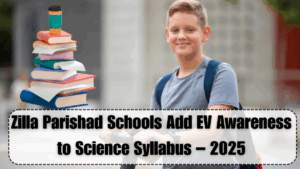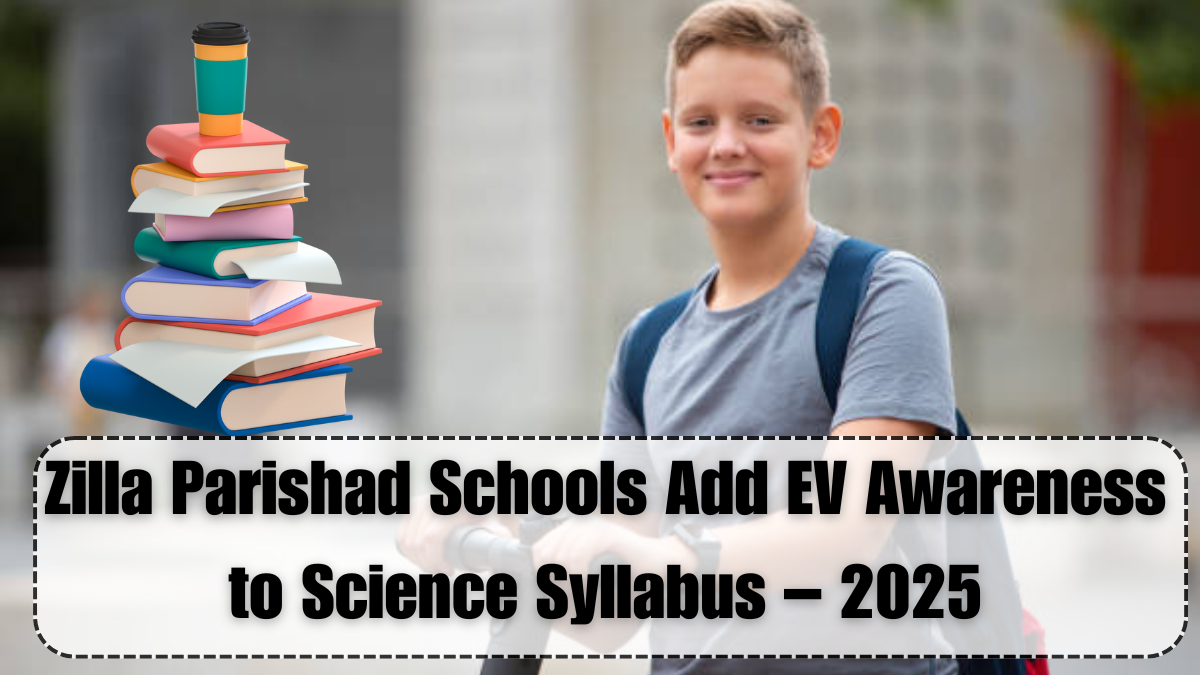In 2025, rural education in India is undergoing a quiet but impactful transformation. One of the most significant changes is the introduction of EV education in ZP schools across multiple districts. Zilla Parishad (ZP) schools, traditionally known for their simplicity and accessibility, are now leading the way in teaching electric vehicle (EV) fundamentals as part of their science curriculum.
This new inclusion ensures that students from rural and semi-urban areas are not left behind in the EV revolution sweeping across the country. By learning EV basics at a young age, these students are gaining valuable exposure to emerging technologies, sustainability concepts, and future career paths. The initiative has been received enthusiastically by both educators and students, especially in schools where electricity is now partially powered by solar systems.

Building EV Literacy at the Grassroots Level
The focus of EV education in ZP schools is not on high-end technical jargon but on fundamental concepts such as how electric vehicles work, why they’re important, and how they impact the environment compared to petrol or diesel vehicles. Students are introduced to battery types, charging stations, clean energy, and basic electrical circuits using engaging classroom activities.
The updated school syllabus includes visual aids, charts, and working EV models made from recycled materials. Some ZP schools have also started organizing small EV exhibitions where children explain key components like motors, batteries, and charging systems in their own words. This participatory model is helping kids relate to EVs not as futuristic machines but as part of their everyday world.
Teacher Training and Curriculum Updates
To successfully implement EV education in ZP schools, district education departments have rolled out training workshops for science teachers. These workshops equip teachers with knowledge and tools to introduce EV basics in a way that is fun, accessible, and aligned with the rest of the school syllabus.
The National Council of Educational Research and Training (NCERT) has supported this inclusion by recommending basic EV topics under the “Applied Science and Technology” unit for middle school students. Some districts have gone a step further by offering optional activity books focused entirely on EVs. This ensures that even first-generation learners in ZP schools can understand and engage with the subject matter.
Encouraging Curiosity and Career Awareness
The inclusion of EV basics in rural classrooms is already generating results. Students are showing increased curiosity in STEM subjects and are asking practical questions about how they can build, repair, or ride EVs. Teachers report that classroom discussions have become more interactive, and many children now see careers in EV manufacturing, battery repair, or green technology as real possibilities.
By embedding EV education in ZP schools, local governments are sowing seeds for future engineers, mechanics, and innovators. The curriculum doesn’t just teach how an EV works—it opens doors for students to imagine new careers and innovations grounded in sustainability.
Bridging the Urban-Rural Knowledge Gap
Historically, topics like electric mobility were limited to urban private schools. But the introduction of EV basics into the school syllabus of Zilla Parishad schools is helping bridge the education divide. These rural schools are now on par with their urban counterparts when it comes to exposure to new-age technologies.
The decision to implement this change has been welcomed by parents and village communities, who see it as a step toward modernization and opportunity. Many ZP school campuses now proudly display student-created posters on electric mobility and renewable energy, signaling a deep cultural shift in how rural India sees education and the future.
Summary Table – Key Highlights of EV Awareness in ZP Schools
| Component | Description |
|---|---|
| Curriculum Inclusion | EV topics added to middle-school science units |
| Practical Learning Tools | Charts, models, and EV DIY kits used in classrooms |
| Teacher Training Programs | Specialized training for science teachers on EV concepts |
| Student Exhibitions & Projects | Interactive platforms for students to present what they learn |
| Rural Career Awareness | Inspiring EV-related career goals among students from rural areas |
FAQs
What is EV education in ZP schools?
EV education in ZP schools refers to the inclusion of electric vehicle awareness and basic science concepts in the curriculum of Zilla Parishad (government-run) schools in rural India.
What topics are covered in the school syllabus?
The school syllabus now covers EV basics such as electric motors, batteries, green energy, and environmental benefits of electric vehicles.
Who is teaching EV topics in these schools?
Science teachers in ZP schools have undergone training to introduce EV-related lessons through classroom activities and models.
Are students responding well to the new content?
Yes, students have shown great enthusiasm. They participate in model-making, quizzes, and discussions about how EVs can improve their daily lives.
How does this benefit rural children in the long term?
Introducing EV basics early helps students explore future careers in electric mobility, builds scientific interest, and reduces the urban-rural education gap.
Click here to know more.
